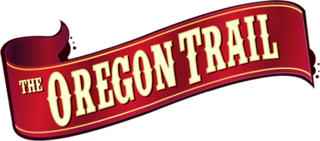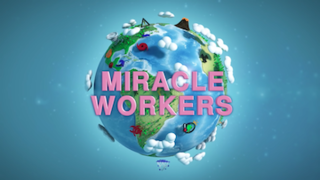The Oregon Trail was a historic migration route across the western United States.
Contents
Oregon Trail may also refer to:
The Oregon Trail was a historic migration route across the western United States.
Oregon Trail may also refer to:
A killer is someone or something that kills, such as a murderer or a serial killer.
Pacifica may refer to:

Robert Sheckley was an American writer. First published in the science-fiction magazines of the 1950s, his many quick-witted stories and novels were famously unpredictable, absurdist, and broadly comical.

The Oregon Trail is a text-based strategy video game developed by Don Rawitsch, Bill Heinemann, and Paul Dillenberger in 1971 and produced by the Minnesota Educational Computing Consortium (MECC) beginning in 1975. It was developed as a computer game to teach school children about the realities of 19th-century pioneer life on the Oregon Trail. In the game, the player assumes the role of a wagon leader guiding a party of settlers from Independence, Missouri, to Oregon City, Oregon via a covered wagon in 1847. Along the way the player must purchase supplies, hunt for food, and make choices on how to proceed along the trail while encountering random events such as storms and wagon breakdowns. The original versions of the game contain no graphics, as they were developed for computers that used teleprinters instead of computer monitors. A later Apple II port added a graphical shooting minigame.
Evolution is change in heritable traits of biological organisms over successive generations.

Denise Michelle Crosby is an American actress and model known for portraying Security Chief Tasha Yar mainly in season one of Star Trek: The Next Generation, and Yar's daughter, the half-Romulan Commander Sela, in subsequent seasons. She is also known for her numerous film and television roles, and for starring in and producing the film Trekkies.
The Minnesota Educational Computing Consortium, most commonly known as MECC, was an organization founded in 1973 best known for developing the edutainment video game series The Oregon Trail and its spinoffs. The goal of the organization was to coordinate and provide computer services to schools in the state of Minnesota; however, its software eventually became popular in schools around the world. MECC had its headquarters in the Brookdale Corporate Center in Brooklyn Center, Minnesota. It was acquired by SoftKey in 1995 and was shut down in 1999.
Power play is a sporting term used in various games
A shadow is a region of darkness where light is blocked.
A legend is a historical narrative, a symbolic representation of folk belief.

Patricia McCormack is an American actress with a career in theater, films, and television.
Dark Ages or Dark Age may refer to:
Outcast or Outcasts may refer to:
A warlord is a military leader.

Roy Barcroft was an American character actor famous for playing villains in B-Westerns and other genres. From 1937 to 1957, he appeared in more than 300 films for Republic Pictures. Film critic Leonard Maltin acclaimed Barcroft as "Republic Pictures' number one bad guy".

Where in the World Is Carmen Sandiego? is a 1996 video game part of the Carmen Sandiego franchise. It was the third version of the game, after the 1985 original title of the same name and a 1992 Deluxe version of said game. The game's release coincided on the heels of the end of the PBS game show, and features QuickTime videos of Lynne Thigpen reprising her role as "The Chief". This was the last version of the game to follow the "classic" formula of the series, but much of the game, especially the "warrant" portion, was heavily redesigned. The Deluxe Edition released in 1998 added speech welcoming the player to each country and an "ACME Global Language Link-Up" satellite which quizzed the user on the local language. Players also received a spy watch and "an introduction to 12 foreign languages".
The Quest may refer to:

The Oregon Trail is a series of educational computer games. The first game was originally developed by Don Rawitsch, Bill Heinemann, and Paul Dillenberger in 1971 and produced by the Minnesota Educational Computing Consortium (MECC) in 1974. The original game was designed to teach eighth grade schoolchildren about the realities of 19th-century pioneer life on the Oregon Trail. The player assumes the role of a wagon leader guiding a party of settlers from Independence, Missouri, to Oregon's Willamette Valley via a covered wagon in 1848.

Miracle Workers is an American anthology comedy television series created by Simon Rich for TBS. It is based in part on Rich's writings, with the first season being based on his 2012 novel What in God's Name, while the short story "Revolution" provided the basis for the second season. The series stars an ensemble cast comprising Daniel Radcliffe, Steve Buscemi, Geraldine Viswanathan, Jon Bass, Karan Soni, Sasha Compère, and Lolly Adefope. The show is a co-production between TBS and FX, whose in-house production company FXP is involved.

The Oregon Trail is an educational strategy video game developed and published by the Minnesota Educational Computing Consortium (MECC). It was first released in 1985 for the Apple II, with later ports to MS-DOS in 1990, Mac in 1991, and Microsoft Windows in 1993. It was created as a re-imagining of the popular text-based game of the same name, originally created in 1971 and published by MECC in 1975. In the game, the player assumes the role of a wagon leader guiding a party of settlers from Independence, Missouri, to Oregon's Willamette Valley via a covered wagon on the Oregon Trail in 1848. Along the trail, the player makes choices about supplies, resource management, and the route, and deals with hunting for food, crossing rivers, and random events such as storms and disease.